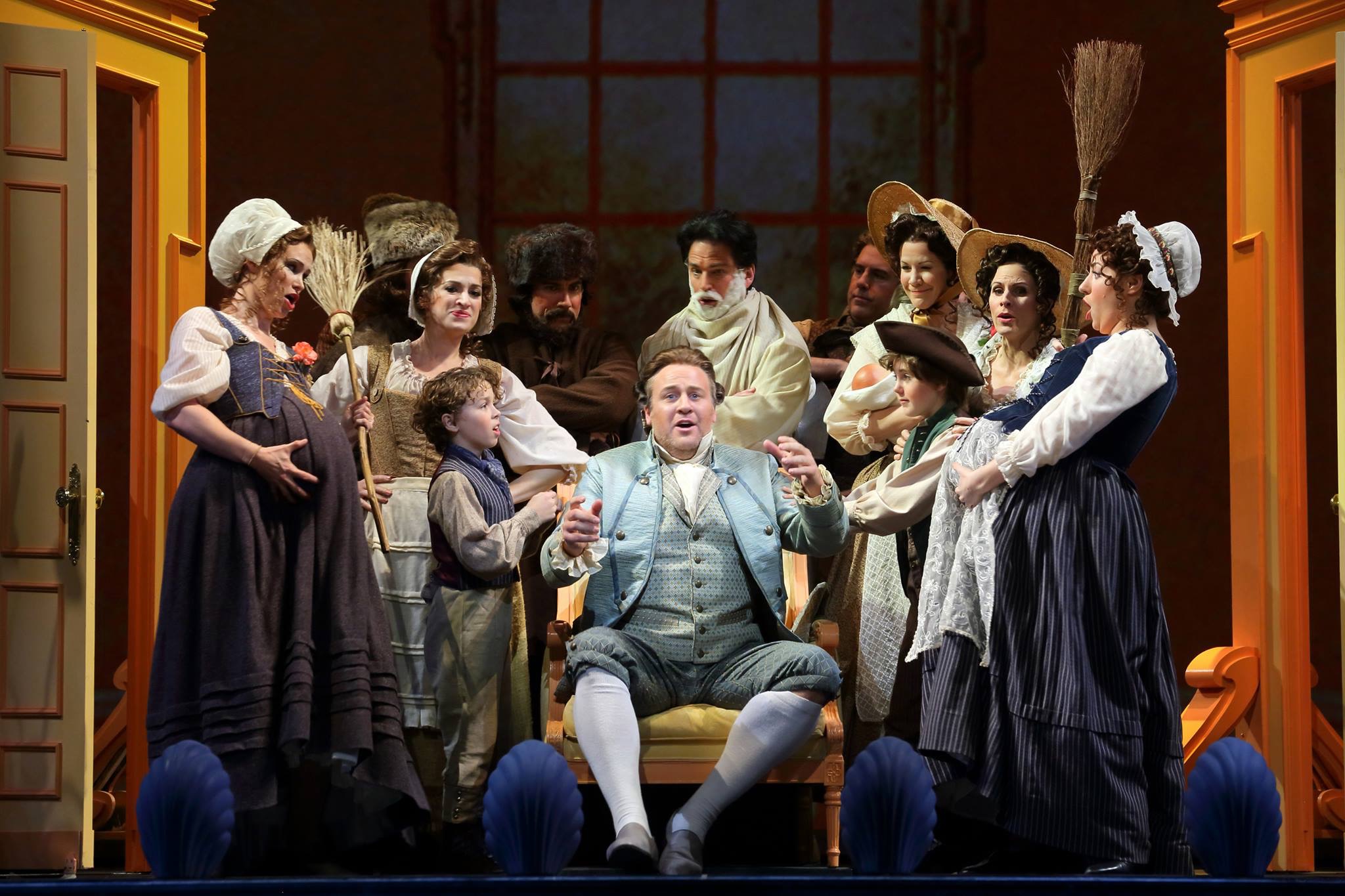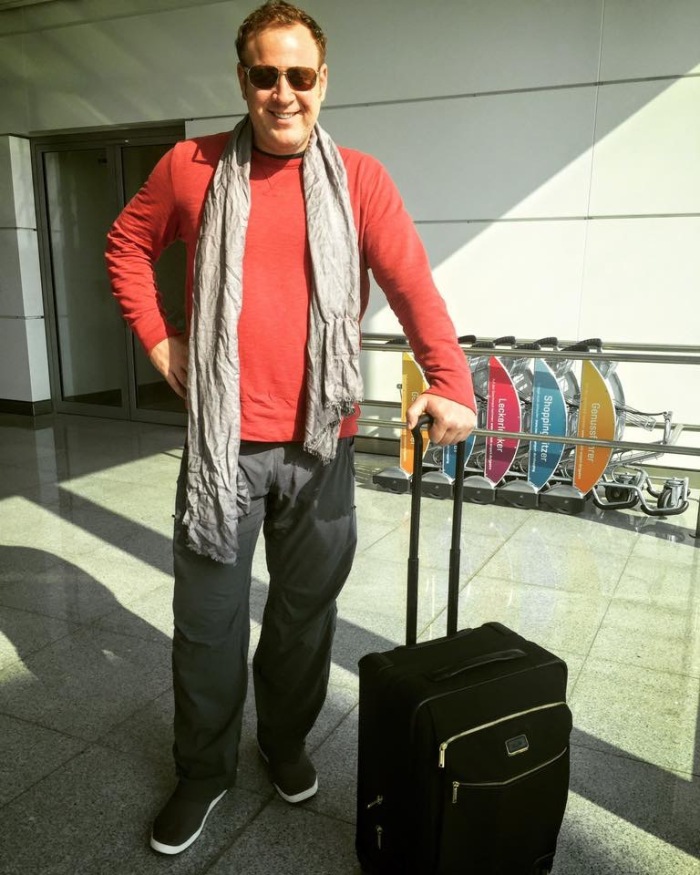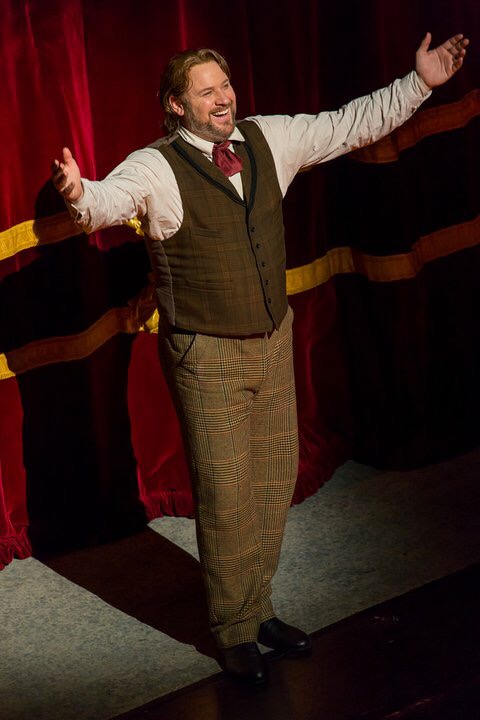
I’m gonna give you all an insider’s perspective on the opera world. I get asked about these opera myths so often that I needed to set the record straight.
I love clearing the air and letting people in on the opera world – I could write an entire blog post for each myth so bear with the long responses, there’s a lot to be said!
Opera Myth #1: All Opera Singers Are Fat
Unfortunately, there is a lot of judgment and prejudice thrown at overweight people. When a large person gets up in front of you on stage and kicks ass and takes names, it goes against some people’s pre-conceived notions of what an overweight person should be achieving. If we are being honest, there are not many performers whose looks are not an important aspect of their success. As I’ve stated in previous blog posts, these days looks play a much greater role in the world of opera than they used to. This myth stems from a time when opera was mostly about the voice and not about appearances.
Some of the best singers of all time have been large-bodied but first and foremost they had amazing voices. Unfortunately, in this day and age, fat people are judged on their appearance more than their vocal talent. For me, I don’t care if you are fat or skinny – the most important thing is whether or not you can move me with your voice.
The Reality: Opera singers come in all shapes and sizes.
Opera Myth #2: If You Lose Weight, Your Vocal Quality Will Suffer
This one is very personal for me since I just lost 50 pounds; I get asked about this quite a lot. Personally, I haven’t noticed a change in my abilities – and neither has the public.
Some singers who have lost weight sound different after their weight loss for a variety of reasons. It may be possible that the foundation of their breathing technique is comprised. The foundation of singing opera is controlled, pressurized air and how you send that air across your vocal cords. The beginning of that foundation is how you take a breath. For every breath you take, you are met with the resistance of your fat, skin, and anything else (corset, belt, back brace). Once a large amount of fat that is usually there for resistance is removed, one could have some difficulty realigning their breath in their new body.
In short, it’s certainly possible that an opera singer’s voice can change after weight loss (or gain!), but this isn’t a consistent result for every opera singer who loses weight.
The Reality: Weight loss affects everyone differently, including opera singers.
Opera Myth #3: Singers Shouldn’t Eat or Drink Before A Show
We’ve all heard stories about singers being sensitive to food and drinks like dairy, spicy food, orange juice, tomatoes, etc., and once in a while, I run into them in the opera world.
Opera singers place limitations on themselves and their voices. Trust me, it takes one to know one. A typical practice day for a singer is only 1-2 hours of singing, as opposed to an instrumentalist who can practice 4-6 hours a day, because the human voice fatigues easily. This leaves singers with a lot of down time but with the motivation to work harder. I believe that some opera singers invent even more limitations in order to feel they are giving everything for their art. In my humble opinion, this myth stems from that.
The truth is you don’t know what you can or can’t eat before a show until you try. If you are an opera singer, try certain foods in a safe environment and see how it affects you. If you drink a glass of milk before a lesson and you sound like a water buffalo in heat, you have your answer. I take acid reflux medication every night. I used to not have an issue with this but over the years I noticed I would wake up feeling vocally fatigued due to excess acid creeping up my esophagus during the night. I learned through trial and error that reflux medication helps me wake up with fresh cords. Don’t place restrictions on yourself because someone else told you to.
The Reality: Try it before you buy it – your body and voice are unique, and there’s no hard and fast rule about what you can or can’t do before a performance.
Opera Myth #4: Opera Singers Can’t Count
In the opera world, there is a running joke that singers have trouble counting all the beats of a measure.
First off, y’all better check yourselves because we opera singers have a big job to do. We have to sing, act, perform in another language, know what we and everyone else on stage is saying in that language, watch the conductor, do the staging, all with lights in our eyes and sweaty wigs on our heads. COMPLETELY MEMORIZED!!!
This is no excuse for a missed beat but when a singer makes a mistake, I always sympathize because I know how hard the job is. Singers who have difficulty with rhythm are understandable because out of all the classical instruments, we don’t have physicality to the beat. We don’t have a bow, a button, a mallet, our fingers or arms to keep the beat. All we have is a conductor 20 feet in front of us steering the wash of sound from the orchestra beneath our feet.
The Reality: We’re smarter than you think but there is a science to a mistake.
Opera Myth #5: All Opera Singers are Divas
Diva? ME?! Do you know who I am? I am the best lyric baritone in the world, and if you or anyone else has a different opinion, you can kiss my ass. I quit!!
The Reality: Opera singers have unique personalities like everyone else.

Opera Myth #6: Opera Singers Love To Travel All the Time
Anyone who travels a lot for work knows that it’s never just a vacation or a fancy trip. If the only travel you do is for vacation, then you have no clue what traveling for a living is like.
Everywhere I go there is a job to do and 100 people who wish they were doing that job and probably think they could do it better, too. Every time I perform, it has to be better than the time before that. This is difficult to do when I have to navigate the tube in London, get antibiotics in Madrid, return a Velo to a bike rental stand in Paris in time for my makeup call, change apartments in Norway because I don’t fit in the tiny shower, try to speak Japanese in Tokyo… I could go on.
You have to keep healthy and be well-rested to do your job well. Your routine at home is out the door the second you get off the plane and you have to adapt quickly to each foreign environment. This takes a toll on your body and your emotional health. Sometimes all we want to do is stay in our comfy homes for more than two weeks and buy toilet paper in bulk from Costco but we simply can’t.
The Reality: It’s harder than it looks.
Opera Myth #7: Singing Karaoke and Opera are the Same Thing
The biggest difference between singing karaoke and opera is the use of a mic and (often) the involvement of booze. Most opera singers don’t even know how to hold a mic let alone use it to their advantage, which is understandable.
Opera singers can get away with music by Frank Sinatra or Tom Jones because those artists use more of a classical technique. When singing country, R&B, or 80’s rock, it’s much harder because of the use of singing techniques like straight-toning and belting – which are rare in opera. I’m friends with some really good karaoke/opera singers, but they’re a dime a dozen.
Reality: It’s hard to unlearn proper technique when you’re in a bar with friends.
Opera Myth #8: Opera Singers are Snooty
Opera singers are chill people and we live relatively normal lives other than trying to stab each other on stage from time to time. This myth is a great example of the squeaky wheel getting the grease.
You rarely hear about the colleague who for forty years shows up on time with their music learned and is a joy to be around. These people represent the majority of us because nobody wants to work with a person who isn’t committed to their job.
Begrudgingly I must admit that I have a penchant for Hermes pocket squares and fine wine, but I also love my NFL games, Xbox, and shooting hoops with friends every now and again.
The Reality: We’re surprisingly normal.
Opera Myth #9: Weight-Lifting Can Damage Your Voice
Shoutout to my friend Jason Lindsay for bringing this one up, as this myth is partially true.
If you find yourself doing a lot of neck, shoulder, and high upper-body exercises, you could potentially strain yourself in a hurtful way. If you’re doing exercises that are from your chest down, you should be pretty safe. (Be sure to check with a weight-lifting instructor before you add this to your fitness regimen, no matter what!)
Whenever I feel tension in my neck while doing shoulder exercises I do a few head rolls to loosen up. The first thing when you’re going to exercise is you need to listen to your body. If you’re on your last set and you feel like you may be overdoing it, then lower the weight or stop. Don’t push through because that’s when you can hurt yourself. Otherwise, lift away!
The Reality: As long as you’re weight lifting in a safe way, you won’t compromise your vocal quality.
Opera Myth #10: Opera Singers Sing For Free
More than any other question I get asked outside of the opera world is, “Do you get paid to sing?” Yes. I do.
I spent 8 years in higher education for a mere chance at this job. It’s not just a hobby, it’s a career – a very meticulous, strenuous, high-pressure, spectacular career that is based on creativity, expression, and humanism that is so fulfilling that sometimes I ask myself the same, “Do I really get paid to sing?” It may seem like a myth when you’re early in your opera career, but it actually can happen.
The Reality: It’s a dream come true.

With all of these myths, you have to keep in mind that different techniques, approaches, and methods work differently for every person so I’m not here to tell you ‘do what I do.’ These are just my opinions based on my experiences. I would love to hear any of your thoughts on these myths and add any more to the conversation!

Hey there Lucas, fellow baritone here and long time follower (I mean, you sing all my repertoire so why wouldn’t I?). Also started a blog of my own so it has been nice following and reading yours as kind of a guide. I totally appreciate your discussion on the diva myth. I used to sing in the chorus with the now Austin Opera (my first professional venture) and I was simply delighted by how genuine, collaborative, and outright friendly the professional soloists were. They were a great, and plentiful model for the artist I am becoming today. I also really appreciate the food/drink myth.
One of the myths I’ve always wanted to discuss is that of blacklisting, primarily to younger singers. So many young singers worry about auditioning for this or that because they are afraid they will be blacklisted and prevent their career from progressing. It’s a topic I don’t think get’s discussed enough and one that would help build confidence and give clarity to young singers.
Anyway, it’s a pleasure. And I look forward to meeting you some day, as I’m sure we inevitably will in this biz.
Jay
Hey Jay. Thanks for the shout out. I always love getting ideas for new things to write about. Blacklisting can be a delicate subject. Hard to approach from the side of the singer and the management. I’ll give some extra thought to it and see if I can come up with a way to talk about it from both sides of the coin. Hope our paths cross soon. Until then, keep singing pretty.
Love your article! I have been an opera lover since early childhood, but alas, I do not have the voice that would allow me to be anything but a listener. However, as my father used to say, somebody has to buy the tickets! I don’t travel as much as I used to, but hope someday to happen to be in a city where you are performing.
I love your fathers words of wisdom. Hope you can make it to a show soon.
You hit the nail on the head with this blog/article, Mr. Meachem. All of these myths are just that, like you say. I have performed in plays, musicals and operas. Definitely, singing opera is the most difficult and challenging, for the reasons you mentioned. For example, years ago, I sang Guglielmo in Mozart’s ” Cosi Fan Tutte “. Now that is a long opera, with a lot to memorize! It’s amazing to me, how few mistakes pro opera singers make! Another point, that I’d like to add, is that many opera singers perform in many languages, and they need to understand what words mean in the libretto, in order To interpret well. This can be very challenging. I have sung in 10 languages, and studied 6. For the ones I didn’t fully understand, I worked with an interpreter so that I could realize my best interpretation of the words and music. I majored in theater,in college, for several years, before I switched to music/voice, so I had an advantage of knowing a little bit of acting. Obviously, opera is a complicated art form that requires a great deal of discipline, passion and dedication, for those who are performers/artists.
It IS amazing how few mistakes pros make when you weigh all of the factors that go into singing an entire role. Nice to be appreciated.
Lucas, met you in San Antonio at their kickoff gala, and still waiting for you to come to HGO! Congrats on the weight loss! Rhonda Sweeney
You won’t have to wait too much longer Rhonda… Keep an eye on my website for more details.
Went to a Trustees meeting at HGO tonight when the next season was announced!!!!! Can hardly wait — HOORAY!
Lucas, remember it’s vocal “cords” (or folds), not vocal “chords.” A slip of the pen, I’m sure.
Thanks for your watchful eye. It was a total slip.
In myth number 2, surely you mean that their breathing technique is “compromised,” not “comprised.” But I still love this blog!
“Compromised”
Of course. Thanks for letting me know. I changed it immediately.
Hello
I’m so glad you’re doing this blog. They have been wonderfully inciteful. Although most of my work as a tenor is in Concert/Oratorio rather than fully staged operas, I’m always trying to grow and learn everyday and keep an eye out for regional opportunities (I’m not far from the bay) I definitely agree with your sentiment about traveling. My main GIG is a year round post with Toccata Symphony but I Freelance with other orchestras that requires quite a bit of travel. Probably nowhere near the frequency that you do but it takes a roll.
Cheers and let me know next time your performing in the bay area. Would love to hear you live.
Brad Perry
Thanks Brad. So happy you’re enjoying the BLOG posts. I am really having fun writing them as well. I’ll be back in the Bay Area this summer.